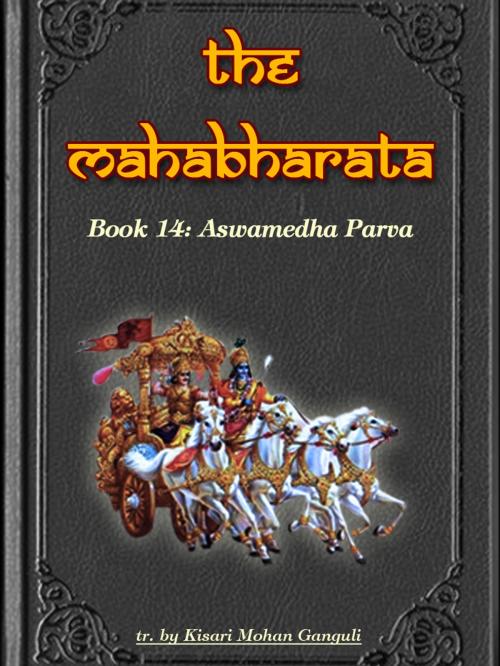The Mahabharata, Book 14: Aswamedha Parva
Nonfiction, Religion & Spirituality, Eastern Religions, Hinduism, Inspiration & Meditation, Spirituality, History| Author: | Kisari Mohan Ganguli | ISBN: | 1230000036226 |
| Publisher: | AppsPublisher | Publication: | December 3, 2012 |
| Imprint: | Language: | English |
| Author: | Kisari Mohan Ganguli |
| ISBN: | 1230000036226 |
| Publisher: | AppsPublisher |
| Publication: | December 3, 2012 |
| Imprint: | |
| Language: | English |
The Mahabharata, Book 14: Aswamedha Parva
Kisari Mohan Ganguli, tr.
Om! Having bowed down to Narayana, and Nara the foremost of male beings, and the goddess Saraswati also, must the word Jaya be uttered.
It is of immense importance to the culture of the Indian subcontinent, and is a major text of Hinduism. Its discussion of human goals (artha or purpose, kama or pleasure, dharma or duty/harmony, and moksha or liberation) takes place in a long-standing tradition, attempting to explain the relationship of the individual to society and the world (the nature of the 'Self') and the workings of karma.
The object of a translator should ever be to hold the mirror upto his author. That being so, his chief duty is to represent so far as practicable the manner in which his author's ideas have been expressed, retaining if possible at the sacrifice of idiom and taste all the peculiarities of his author's imagery and of language as well. In regard to translations from the Sanskrit, nothing is easier than to dish up Hindu ideas, so as to make them agreeable to English taste. But the endeavour of the present translator has been to give in the following pages as literal a rendering as possible of the great work of Vyasa. To the purely English reader there is much in the following pages that will strike as ridiculous. Those unacquainted with any language but their own are generally very exclusive in matters of taste. Having no knowledge of models other than what they meet with in their own tongue, the standard they have formed of purity and taste in composition must necessarily be a narrow one. The translator, however, would ill-discharge his duty, if for the sake of avoiding ridicule, he sacrificed fidelity to the original. He must represent his author as he is, not as he should be to please the narrow taste of those entirely unacquainted with him. Mr. Pickford, in the preface to his English translation of the Mahavira Charita, ably defends a close adherence to the original even at the sacrifice of idiom and taste against the claims of what has been called 'Free Translation,' which means dressing the author in an outlandish garb to please those to whom he is introduced.
"Vaisampayana said, "After the king Dhritarashtra had offered libations of water (unto the manes of Bhisma), the mighty-armed 1 Yudhishthira, with his senses bewildered, placing the former in his front, ascended the banks (of the river), his eyes suffused with tears, and dropt down on the bank of the Ganga like an elephant pierced by the hunter. Then incited by Krishna, Bhima took him up sinking. 'This must not be so,' said Krishna, the grinder of hostile hosts. The Pandavas, O king, saw Yudhishthira, the son of Dharma, troubled and lying on the ground, and also sighing again and again. And seeing the king despondent and feeble, the Pandavas, overwhelmed with grief, sat down, surrounding him. And endowed with high intelligence and having the sight of wisdom, king Dhritarashtra, exceedingly afflicted with grief for his sons, addressed the monarch, saying,--'Rise up, O thou tiger among the Kurus. Do thou now attend to thy duties. O Kunti's son, thou hast conquered this Earth according to the usage of the Kshatriyas. Do thou now, O lord of men, enjoy her with thy brothers and friends. O foremost of the righteous, I do not see why thou shouldst grieve.
The Mahabharata, Book 14: Aswamedha Parva
Kisari Mohan Ganguli, tr.
Om! Having bowed down to Narayana, and Nara the foremost of male beings, and the goddess Saraswati also, must the word Jaya be uttered.
It is of immense importance to the culture of the Indian subcontinent, and is a major text of Hinduism. Its discussion of human goals (artha or purpose, kama or pleasure, dharma or duty/harmony, and moksha or liberation) takes place in a long-standing tradition, attempting to explain the relationship of the individual to society and the world (the nature of the 'Self') and the workings of karma.
The object of a translator should ever be to hold the mirror upto his author. That being so, his chief duty is to represent so far as practicable the manner in which his author's ideas have been expressed, retaining if possible at the sacrifice of idiom and taste all the peculiarities of his author's imagery and of language as well. In regard to translations from the Sanskrit, nothing is easier than to dish up Hindu ideas, so as to make them agreeable to English taste. But the endeavour of the present translator has been to give in the following pages as literal a rendering as possible of the great work of Vyasa. To the purely English reader there is much in the following pages that will strike as ridiculous. Those unacquainted with any language but their own are generally very exclusive in matters of taste. Having no knowledge of models other than what they meet with in their own tongue, the standard they have formed of purity and taste in composition must necessarily be a narrow one. The translator, however, would ill-discharge his duty, if for the sake of avoiding ridicule, he sacrificed fidelity to the original. He must represent his author as he is, not as he should be to please the narrow taste of those entirely unacquainted with him. Mr. Pickford, in the preface to his English translation of the Mahavira Charita, ably defends a close adherence to the original even at the sacrifice of idiom and taste against the claims of what has been called 'Free Translation,' which means dressing the author in an outlandish garb to please those to whom he is introduced.
"Vaisampayana said, "After the king Dhritarashtra had offered libations of water (unto the manes of Bhisma), the mighty-armed 1 Yudhishthira, with his senses bewildered, placing the former in his front, ascended the banks (of the river), his eyes suffused with tears, and dropt down on the bank of the Ganga like an elephant pierced by the hunter. Then incited by Krishna, Bhima took him up sinking. 'This must not be so,' said Krishna, the grinder of hostile hosts. The Pandavas, O king, saw Yudhishthira, the son of Dharma, troubled and lying on the ground, and also sighing again and again. And seeing the king despondent and feeble, the Pandavas, overwhelmed with grief, sat down, surrounding him. And endowed with high intelligence and having the sight of wisdom, king Dhritarashtra, exceedingly afflicted with grief for his sons, addressed the monarch, saying,--'Rise up, O thou tiger among the Kurus. Do thou now attend to thy duties. O Kunti's son, thou hast conquered this Earth according to the usage of the Kshatriyas. Do thou now, O lord of men, enjoy her with thy brothers and friends. O foremost of the righteous, I do not see why thou shouldst grieve.















